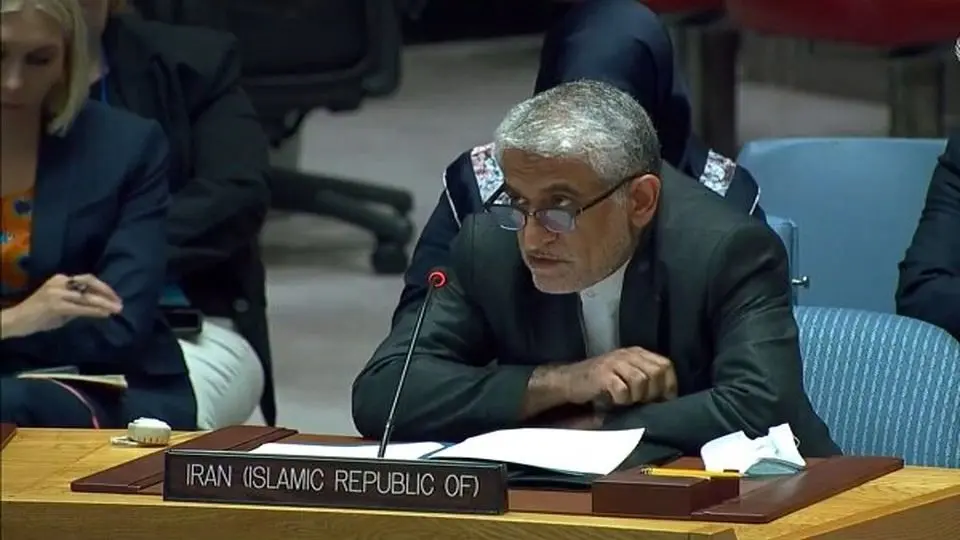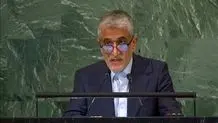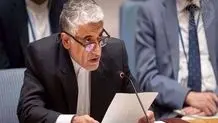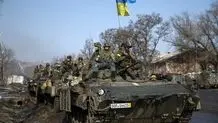Iran UN envoy:
Israel main obstacle to creating Middle East free of WMD
Iran's envoy to the UN said that the Zionist regime is the main obstacle to creating a Middle East free of weapons of mass destruction, calling on the international community to assist the region in overcoming these obstacles.

MEHR: Iran's envoy to the UN said that the Zionist regime is the main obstacle to creating a Middle East free of weapons of mass destruction, calling on the international community to assist the region in overcoming these obstacles.
Addressing the Third Session of the Conference on the Establishment of a Middle East Zone Free of Nuclear Weapons and Other Weapons of Mass Destruction, Iran's Ambassador and Permanent Representative to the UN Amir Saeed Iravani said, "Unfortunately, they remain silent against the proliferation of weapons of mass destruction by Israel With the support of the United States. They do not dare to take any position against the non-participation of these two in the Conference but raise baseless accusations against Iran. Such an approach should be stopped and if it continues on the part of these countries, the Conference should take the necessary decision in this regard."
The full text of Iravani's speech is as follows:
In the Name of God, the Most Beneficent, the Most Merciful
Madam. President,
Let me begin by extending my congratulation to Your Excellency, for endorsing you as the President of the Conference on the Establishment of a Middle East Zone Free of Nuclear Weapons and Other Weapons of Mass Destruction. Please rest assured of my delegation’s full cooperation. Let me further convey our appreciation to Kuwait and Jordan for helping to make the Conference successful thus far.
Madam President,
Consistent with Iran’s deliberate option to reject all WMDs and as a party to all related treaties, namely, the NPT, BWC, and CWC, our active and constructive participation in this Conference is a robust testimony to our genuine call for the total and final elimination of all WMDs. This, indeed, is a clear manifestation of the firm and everlasting commitment of the Islamic Republic of Iran to the cause of nuclear disarmament and non-proliferation, as well as the realization of a WMD-free zone in the Middle East, the nuclear part of which was initially proposed by Iran in 1974.
We expect that other Conference members will share this clear stance and that it will appear in the report of this session of the Conference. Any insinuation otherwise, will challenge and so hamper the objective of the Conference to happen early and completely.
Madam President,
To guarantee that all parties are on equal footing when it comes to joining the treaty, they should have previously ratified and implemented all major and important treaties and conventions, such as the NPT, BWC, and CWC. A nuclear-weapon-free zone (NWFZ) is defined as an agreement that a group of states have freely established by treaty which prohibits the development, manufacturing, control, possession, testing, stationing, transit, or transport of nuclear weapons in a given area, with verification mechanisms, according to the 1999 Report of the Disarmament Commission and its guidelines on the establishment of nuclear-weapon-free zones reflected in document A/54/42.
Madam President,
On another note, I would like to join others in expressing their frustration with the failure of the two consecutive NPT Review Conferences in 2015 and 2022 as well as the failure of the fourth CWC Review Conference in 2018 causing continued disappointment for the lack of progress in moving forward in the implementation of the 1995 NPT Review and indefinite extension Conference resolution on the Middle East.
Let alone the drafted language in the recent NPT Review Conference that was the weakest language ever on the Middle East zone free of WMDs in the NPT context without even simple support required to extend to the UNGA track and also the way it was handled in a non-transparent and non-inclusive manner at the Review Conference. We are clearly warning about the implications of such an approach to the work and results of the Conference.
It is noteworthy to reiterate that the processes emanating from the NPT Review Conferences and UNGA decision 546 are two independent yet parallel avenues intended to achieve this long-overdue goal which should be fulfilled with the two tracks' action-oriented decisions. These two can complement, but cannot replace, each other.
However, in light of the reality on the ground, it is clear that both processes are confronted with significant impediments that might jeopardize their success. In light of the impediments around the creation of such a zone and as the main requirement to strengthen regional security in the Middle East, the Israeli regime must first and foremost adopt a transparent policy and leave the so-called strategic ambiguity, renounce possession of WMDs, and join all relevant international legally-binding instruments.
Above all, it must unconditionally accede to the NPT while subjecting all of its nuclear facilities and activities to the IAEA's comprehensive safeguards. In this vein, its accession to an implementation of the CWC and BWC is imperative.
Meanwhile, we reiterate our fundamental position that the Conference's success will be in jeopardy as long as Israel refuses to participate while the US supports it and does not participate in the Conference. We call on the international community to assist the region in overcoming these obstacles in establishing the Middle East free of all types of weapons of mass destruction.
The United States' unwavering support for the Israeli regime, which includes its condoning of Israel’s dangerous nuclear weapon program, as well as the US and Israel’s refusal to engage constructively in the work of the current Conference must be duly considered in the Conference aiming at exploring different channels to overcome these obstacles.
Madam President,
I should reiterate that for us, the treaty establishing a WMD-free zone in the Middle East, like all other similar regional treaties, is consistent with any group of States' right to conclude regional treaties to ensure the total absence of nuclear weapons in their respective territories as enshrined in Article VII of the NPT. After the nuclear part of the treaty is concluded, the proper posture and solution for other types of WMDs should be thought through. The Working Committee, as the expert arm of the Conference, can enrich the discussions thereof.
Madam President,
A word of wisdom addressed to some speakers who raised issues regarding the JCPOA, Iran's nuclear activities, and other issues. From our perspective, this approach against Iran is unprofessional and pointless. Because the declared and practical policy of the Islamic Republic of Iran is completely different from the alleged arguments.
Given the human considerations and religious teachings, rational calculations of national interests, the bitter experience of being a victim against a terrible type of weapons of mass destruction, and observing the failed experience of others, we reject weapons of mass destruction.
Such baseless accusations against Iran are raised in a situation where the main threat and obstacle to creating a Middle East free of weapons of mass destruction, namely, Israel, is provenly equipped with all types of these inhumane weapons.
Such allegations are raised at the cost of ignoring this main threat. We do not consider such an approach constructive or useful and doing so has not led so far to any benefits though made in various forums. We advise these speakers to abandon such a position and not to distort the current conference, which can approach the main goal with constructive talks.
On JCPOA the undeniable fact is that the US withdrawal from the JCPOA in 2018, as well as reimposing sanctions besides the unwillingness of the current US Administration to return to it, have caused immense damage to international efforts toward nuclear non-proliferation.
Iran has, however, consistently complied with its obligations under the Comprehensive Safeguard Agreement and has been cooperating with the IAEA. The technical interaction between Iran and the IAEA is going on and in response to the recent visit of an Iranian technical delegation to Vienna, we are to receive the IAEA team for further consultations aiming at resolving the outstanding questions.
And to the Western nuclear weapon States participating in this Conference as observers, we invite them not to abuse the opportunity given to them to consult with the countries of the region to create the Middle East free of weapons of mass destruction, but instead to focus on the main expectation from them in the framework of the Conference, which is the negotiation to grant negative security assurances to the countries of the region.
Ironically, these countries themselves have violated their legally binding obligations according to the NPT by strengthening their nuclear weapon arsenals, and beyond that by helping Israel obtain nuclear weapons.
Unfortunately, they remain silent against the proliferation of weapons of mass destruction by Israel With the support of the United States. They do not dare to take any position against the non-participation of these two in the Conference but raise baseless accusations against Iran. Such an approach should be stopped and if it continues on the part of these countries, the Conference should take the necessary decision in this regard.
Finally, it is my honor to state that, in continuation of Iran’s constructive policy, we will support the process emanated from the NPT to the establishment of a Middle East Zone free of WMDs and will continue to contribute to the subsequent sessions of this Conference until this goal is achieved. This will enhance the regional security in the Middle East and its sub-regions including in the Persian Gulf.
I thank you, Madam. President.




